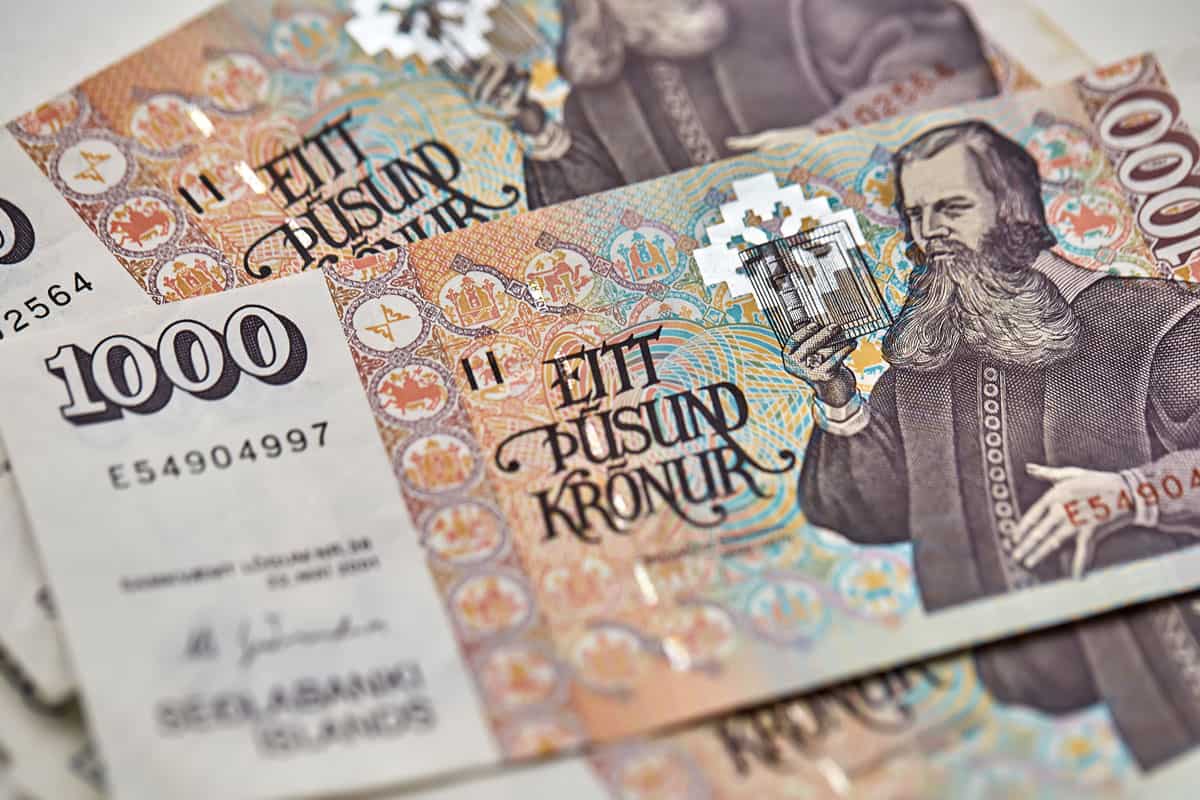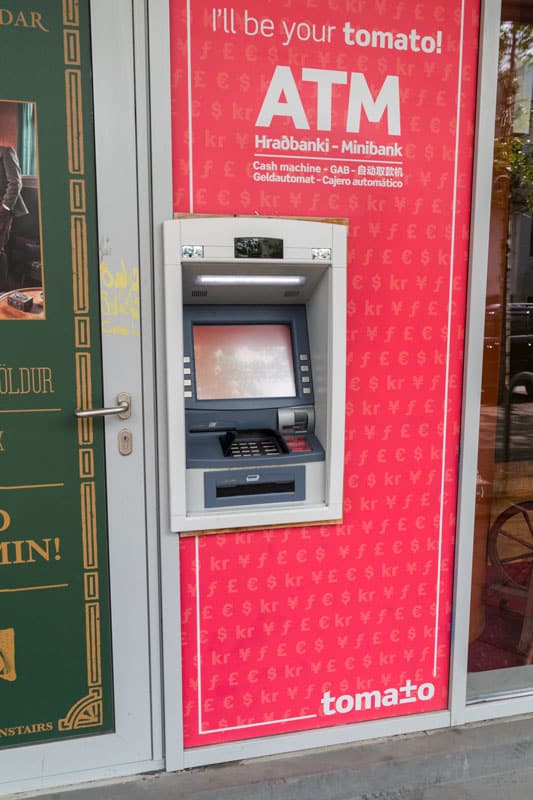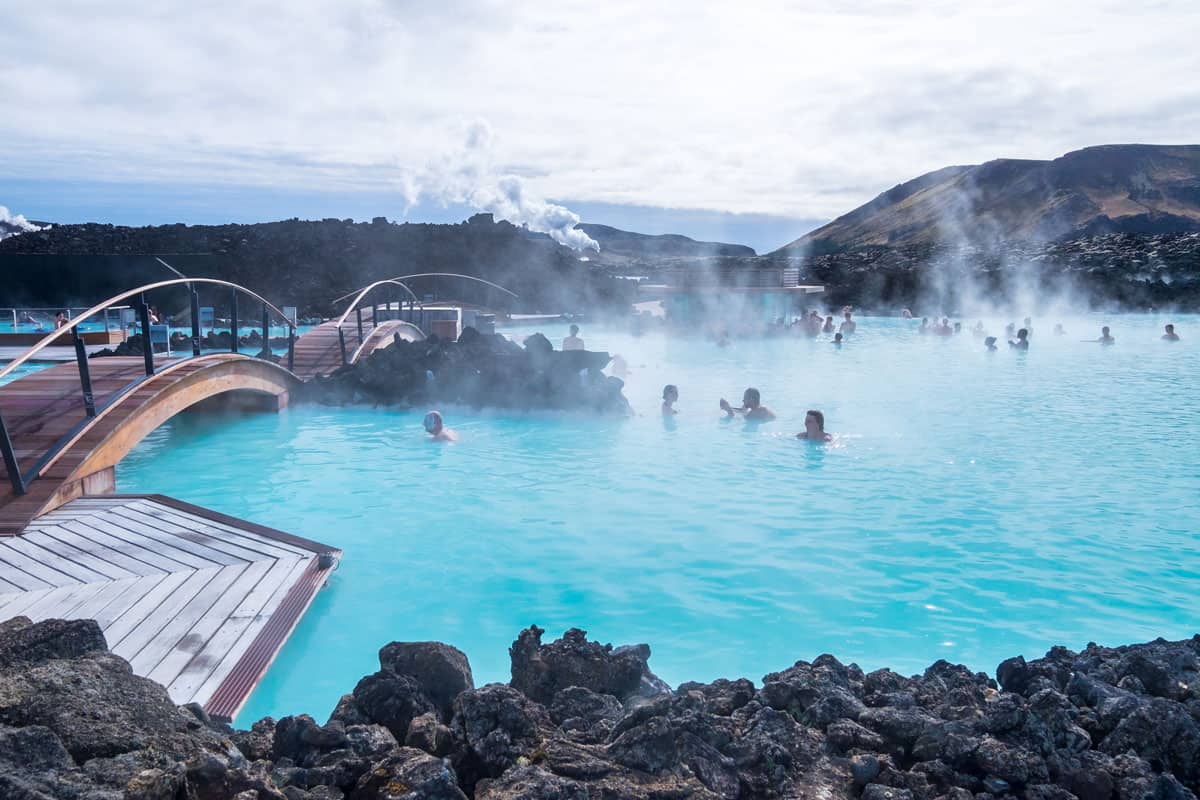Iceland is a small nation that many tourists have on their bucket lists. If you are planning a trip to Iceland, you may be wondering what currency is acceptable. Let's take a look so you know what to expect.
The Icelandic krona (ISK) is the official currency of Iceland, and it's accepted nearly everywhere across the country. Credit and debit cards are also widely accepted in Iceland, so it's easy to pay for goods and services using your card. Some larger hotels and restaurants will accept other currencies, such as USD and EUR, but this is rare.
Understanding how to pay for goods and services in Iceland is important for any traveler to ensure they can make purchases without any issues. In this article, we will take a closer look at accepted currencies and give you tips before your trip. In addition, we will answer other frequently asked questions about visiting Iceland, so read on!
![Handsome hispanic man smiling happy and confident at the city holding 1000 iceland krona banknotes, What Currency Is Acceptable In Iceland? [Tips For Travelers]](https://tripmemos.com/wp-content/uploads/2022/11/What-Currency-Is-Acceptable-In-Iceland-Tips-For-Travelers.png)
What Currency Can I Use In Iceland?
Iceland is a sight to see due to its diverse landscape and stunning attractions. From volcano-filled landscapes to glaciers and waterfalls, it's a paradise for outdoor enthusiasts.
When planning a trip to any new country, it's important to know what currency is accepted in the local area. The official currency used in Iceland is the Icelandic krona (ISK).
Even though Iceland is part of the European economic area, the krona is still the only official currency accepted in Iceland. With that, you would think the euro would be widely accepted, but unfortunately, it is not.
In addition, don't expect to pay in any other currency either, such as US dollars or British pounds. You may find some select restaurants that accept USD or EUR, but this is rare.
Nonetheless, debit and credit cards are used widely across Iceland, and you should have no problem using your card. If you want to have cash on hand, then we recommend using the ATM at the airport when you arrive.
While you may pay a fee, there are several debit cards that can help you save money when withdrawing cash abroad. Check with your bank to see if they offer any options for international debit cards. If they don't, take out a larger sum so you don't get hit with multiple ATM fees during your trip.
When exchanging money, you may be hit with a poor exchange rate. This is due to the Icelandic krona being a strong currency. So, to get the best exchange rate, it's recommended you withdraw cash from an ATM and pay with your card when possible.

Read up and check out these other tips on money in Iceland:
ATMs Can Be Hard To Find
If you only plan on staying in the Reykjavik area, then you won't have an issue locating an ATM. However, if you are exploring further out into the countryside, then ATMs can be hard to find. To avoid this inconvenience, make sure to withdraw money from an ATM before heading off.
In addition, be sure to plan how much you will need for your daily activities. In rural areas, you may need cash on hand since vendors may not accept cards. It's better to play it safe and have cash on hand.

Bathrooms Cost Money
It may seem odd, but most public restrooms in Iceland are pay-to-use bathrooms. The price will vary depending on the area you are in, but it's good to be aware of.
It's also good to have cash in this situation. Most bathrooms will accept cards, but some only accept coins and paper money.
Value Added Tax Refund
In Iceland, everything you purchase will have a government tax. However, there is a way that you can get some of your money back.
If you spend at least 6,000 ISK or more on goods, you can show the receipt at the airport and get a refund on the taxes you pay. Make sure to keep your receipt and save it until you reach the airport before leaving Iceland.
It's important to know a few things about the VAT refund. First, it only applies to things such as souvenirs, clothes, and goods. It won't apply to food and drinks at restaurants.
The refund will come back in Icelandic krona, so you will need to exchange it for your home currency. You then will need to exchange it at the airport before you leave. Some banks won't exchange ISK, so it's important to call ahead before you go.
Lastly, arrive early to get your VAT refund. Since there are several tourists leaving Iceland, the lines can be long. It's better to plan for extra time at the airport to get your refund without rushing.
Nonetheless, if you did a lot of shopping while visiting Iceland, the tax refund can be a nice bonus.
Paying For Gas Can Be Tricky
Most gas stations in Iceland only take cash or a card with a PIN. Since most credit cards don't have a PIN, you will need to pay with cash or a debit card. Make sure you always have some on hand when traveling around the country.
In addition, some Iceland gas stations will close early or won't have an attendant available. The last thing you want is to be stranded without fuel.
To avoid this, make sure you monitor your gas usage and always fill up when you are near a station. In addition, be sure to have cash on hand and tell your bank you are traveling so your debit card won't get declined.

How Much Money Should I Bring To Iceland For A Week?
As mentioned earlier, Iceland's currency is strong, and most things are expensive. With that being said, you can expect to pay $150-200 a day for food, accommodations, and activities.
Of course, this depends on what you do and the type of accommodations you choose. To be safe, you should plan to bring at least $1,000 for a week's stay in Iceland. This should cover most of your expenses, but it's always better to have more cash than you need.
How Much Do You Tip In Icelandic Restaurants?
In the United States, tipping is customary for restaurant services. In fact, there is a hidden rule on how much you should tip a server based on the bill.
Iceland is different. In general, tipping at restaurants isn't expected or necessary in Iceland. However, it is still appreciated if you felt like you had excellent service.
If you do choose to tip, you will typically leave a 5-10% gratuity. This is more than enough for Icelandic restaurants and will be appreciated by the server.
The reason tipping isn't required is due to the higher wages that servers receive. This makes it more financially feasible for restaurants to pay their workers a livable wage rather than relying on tips.
You may notice tipping jars in cafes when visiting Iceland. These tipping jars are actually meant to fund employee gatherings such as parties and outings. So, if you decide to leave a few coins in the jar, they will be put to good use.
Lastly, for tour guides and shuttle services, it's a good idea to leave a tip. The people with these companies usually work independently or make a lower wage. So, if you have a good experience, show your appreciation with a small tip.

Do You Have To Ask For A Check In Iceland?
In the United States, it may come across as poor service if you don't get a check for your meal. However, that's not always the case in Iceland.
In Iceland, you will find that the overall atmosphere is more laid back. People like to hang out and take their time with meals.
With this in mind, don't expect to have services ask if you're ready for a check. So, don't feel like you are being rude by asking for the check. In fact, you may have to wave someone down for a check at the end of your meal.
Final Thoughts

Overall, you can expect to have an amazing experience when visiting Iceland. However, it's important to be aware of certain customs and practices that you may not find in other countries. Not only ensure you have Icelandic krona on you, but also make sure your bank or credit card provider knows you are traveling so your card won't get declined.
Made it to the end? Here are other articles you might find helpful:
Can I Drive In Iceland With A US License?
Redress Number Vs Known Traveler Number: What’s The Difference?
Domestic Vs. International Flight: What’s The Difference? [Inc. Tips And Advice]

Very nice.